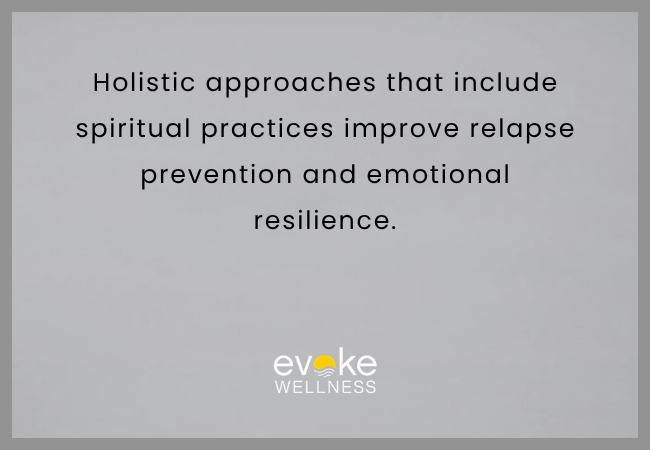Healing from mental health challenges and substance use disorders requires more than symptom relief—it calls for a comprehensive approach that treats the whole person. Holistic behavioral health programs are grounded in the belief that lasting recovery happens when the mind, body, and spirit are treated together, not as separate systems. These programs aim to restore balance, improve well-being, and empower individuals to rebuild their lives with intention, resilience, and purpose.
At Evoke Wellness Ohio, we understand the interconnectedness of psychological, physical, and emotional health. Our holistic approach integrates evidence-based treatments with supportive therapies that nourish every part of a person’s being. Whether someone is struggling with anxiety, depression, trauma, or substance use, healing is most effective when it’s rooted in a whole-person philosophy. In this article, we’ll explore the benefits of holistic behavioral health care, the types of therapies it includes, and how it can transform the recovery journey.
Understanding the Holistic Approach to Behavioral Health
Traditional behavioral health treatment models often prioritize clinical therapy and medication management. While these components are critical, they may not fully address underlying issues that contribute to suffering. Holistic care expands upon this foundation by including therapies that support physical health, spiritual exploration, and lifestyle habits—all of which influence how individuals think, feel, and act.
In holistic behavioral health, recovery isn’t just about stopping unhealthy behaviors or managing diagnoses—it’s about restoring alignment and harmony across all domains of life. It helps individuals move beyond crisis stabilization to cultivate lasting habits, meaningful relationships, and a renewed sense of identity. This integrated care model acknowledges that:
-
Psychological symptoms often stem from unresolved emotional wounds or trauma.
-
Physical health impacts mood, energy, and motivation.
-
Spirituality—however it’s defined—can provide strength, connection, and hope.
-
Habits like nutrition, sleep, and movement directly influence mental well-being.
By incorporating all these elements, holistic programs offer deep, sustainable change rather than surface-level solutions.
Key Components of Holistic Behavioral Health Programs
A holistic behavioral health program isn’t defined by one specific treatment technique. Instead, it draws from a broad spectrum of interventions, tailoring each recovery plan to the individual’s needs, values, and goals. Common features of these programs may include:
1. Psychotherapy and Counseling
Individual therapy, group counseling, and family therapy are essential elements of holistic care. These sessions help clients process past experiences, identify unhelpful thought patterns, and develop tools for emotional regulation. Modalities like Cognitive-Behavioral Therapy (CBT), Dialectical Behavior Therapy (DBT), and trauma-informed care provide the clinical backbone for recovery.
2. Mindfulness and Meditation
Mindfulness practices train individuals to be present in the moment, which reduces anxiety, enhances self-awareness, and improves emotional resilience. Meditation, breathwork, and grounding techniques are commonly used to help clients manage stress and develop inner calm.
3. Physical Wellness and Nutrition
Holistic programs often include fitness routines, yoga, nutritional counseling, and education about the impact of food and exercise on mental health. Restoring physical health helps reduce fatigue, improve mood stability, and boost motivation during recovery.
4. Creative and Expressive Therapies
Art therapy, music therapy, journaling, and other expressive modalities allow clients to explore emotions and experiences they may not yet be able to verbalize. These therapies are deeply healing and often help unlock insight and creativity.
5. Spiritual and Existential Exploration
Spiritual care doesn’t require religious belief. Rather, it invites individuals to explore questions of purpose, meaning, and connection—key factors in long-term healing. Programs may offer yoga, nature therapy, 12-step support, or time for reflection.
6. Complementary Treatments
Massage therapy, acupuncture, aromatherapy, and equine therapy are additional services that may be offered. These techniques support the body’s nervous system and create a soothing environment conducive to deep healing.
Benefits of a Holistic Approach
When mental and physical health are treated together, individuals are more likely to achieve emotional stability, physical vitality, and a renewed sense of self. Holistic programs offer the following key advantages:
-
Improved emotional regulation – Clients learn how to recognize and manage emotional triggers without turning to destructive behaviors.
-
Reduced relapse risk – By addressing the underlying causes of addiction and emotional distress, holistic care promotes long-term recovery.
-
Better physical health – Proper nutrition, sleep, and physical activity strengthen the body’s ability to heal and cope with stress.
-
Greater self-awareness – Clients build insight into their thoughts, patterns, and values, which helps shape healthier decision-making.
-
A deeper sense of purpose – Spiritual exploration and personal growth help clients reconnect with themselves and others.
Who Can Benefit from Holistic Behavioral Health Care?
Holistic behavioral health care can be beneficial for individuals at all stages of recovery. Whether someone is just beginning their treatment journey or has already experienced multiple levels of care, this approach offers renewed hope and energy. People struggling with:
-
Depression, anxiety, or trauma
-
Substance use or co-occurring disorders
-
Chronic stress or burnout
-
Difficulty maintaining relationships or work-life balance
…may find that a holistic program speaks to parts of their identity that traditional care doesn’t fully address.
For instance, someone participating in an Intensive Inpatient Treatment Program in Ohio may be stabilized medically and emotionally, but still feel disconnected or spiritually unwell. Holistic care meets these deeper needs by inviting individuals to explore who they are, what they value, and how they want to live moving forward.
Integrating Holistic Care into Addiction Recovery
Many individuals who come to us have experienced fractured or fragmented care in the past. They may have entered a detox facility, completed a program, and returned home without adequate tools for long-term success. Holistic care aims to prevent this cycle by addressing the whole picture of a person’s life.
In many cases, trauma and unresolved emotional pain are the root causes of substance use. That’s why holistic care complements clinical treatment and addiction education. For example, a person in an Alcohol Addiction Treatment Program in Ohio may also participate in art therapy or meditation sessions to help manage cravings, regulate emotions, and strengthen self-compassion.
Similarly, clients enrolled in Addiction Treatment Programs in Ohio can benefit from wellness planning that includes meal prep, exercise, peer support, and journaling—activities that promote daily routine and internal structure.
This multifaceted support is what makes holistic programs so effective. Clients aren’t just treated for a diagnosis; they are treated as whole human beings worthy of dignity, presence, and personalized care.

The Role of Spiritual Wellness
Spiritual wellness is often misunderstood as religious belief, but in holistic programs, it’s more accurately seen as the search for meaning, connection, and inner peace. Whether clients find this through nature, meditation, creative work, or service, spiritual growth is a powerful anchor for recovery.
Those who participate in services like yoga or reflection groups often report greater calm, reduced anxiety, and an improved ability to navigate uncertainty. In our Mental Health Treatment Center in Ohio, these offerings are woven into every aspect of care—not as an afterthought, but as essential elements of well-being.
Detox and Stabilization as Foundations
Before holistic care can fully take root, many individuals must begin with detoxification to clear the body and stabilize the nervous system. At Evoke Wellness Ohio, our Medical Detox Center in Ohio provides a secure, supportive environment where clients can safely withdraw from substances and prepare for deeper work.
This initial step ensures that each person enters therapy in a clear, focused, and physically grounded state. From there, they transition into programs that integrate holistic elements, allowing for more profound emotional exploration and healing.
Why Choose Evoke Wellness Ohio?
Evoke Wellness Ohio is more than just a treatment facility—we are a community built on compassion, connection, and comprehensive healing. Our holistic behavioral health programs are rooted in evidence-based care, yet expanded with practices that nourish the soul and rejuvenate the body. From individualized therapy to fitness and mindfulness, we offer an immersive environment where healing can flourish.
Clients benefit from our team’s deep experience in trauma care, addiction recovery, and integrative health. Our facility combines medical support with therapeutic and lifestyle interventions, creating a safe space to reflect, grow, and rebuild. For those seeking a full continuum of care, our Residential Treatment Center in Ohio offers the structure, support, and flexibility necessary for personal transformation.
We believe that healing happens when every part of a person is invited into the recovery process—and our programs are designed to honor that truth.
Conclusion
Holistic behavioral health care is about more than managing symptoms—it’s about reconnecting to life with clarity, strength, and purpose. By treating the mind, body, and spirit as one, individuals gain access to healing that is both profound and sustainable. Whether you’re just beginning your recovery or are looking for more meaningful support, Evoke Wellness Ohio offers a pathway forward.
If you’re ready to explore a whole-person approach to healing, call us today at 833-949-1347.
Frequently Asked Questions (FAQs)
What does a holistic behavioral health program include?
Holistic programs combine clinical therapy with complementary treatments like mindfulness, nutrition, physical wellness, and spiritual exploration for whole-person healing.
How is holistic treatment different from traditional therapy?
While traditional therapy focuses mainly on mental health symptoms, holistic treatment addresses emotional, physical, and spiritual well-being together.
Who can benefit from holistic behavioral health care?
Anyone facing mental health challenges, addiction, or emotional distress can benefit—especially those seeking a deeper, long-term recovery approach.
Is holistic care scientifically supported?
Yes. Many holistic therapies, like mindfulness and nutrition, are backed by research showing improvements in mood, stress reduction, and relapse prevention.
Can holistic treatment be part of residential rehab?
Absolutely. Many residential programs, including those at Evoke Wellness Ohio, integrate holistic approaches into structured, immersive recovery environments.



